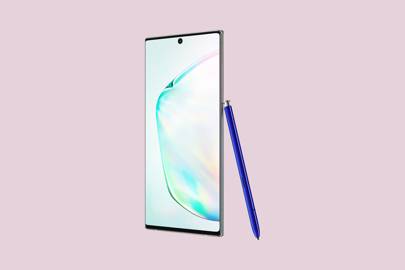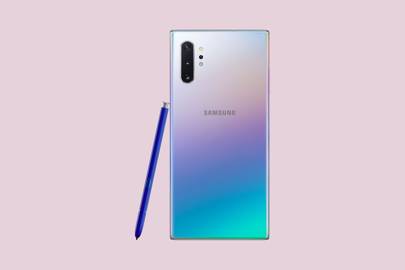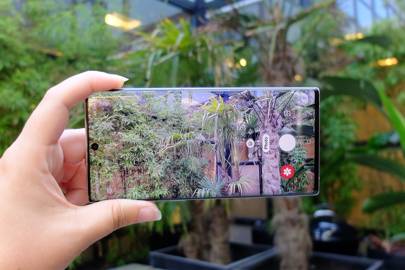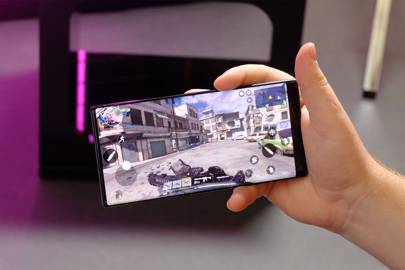
The Galaxy Note 10 Plus is Samsung’s very sleek, very expensive new Note. It’s the kind of device that does a triple double flip when all you asked for was a couple of cartwheels. It’s also a phone of a thousand niches, meaning that whether or not it’s worth the money depends very much on what you need.
Samsung says this phone is aimed at creators, which means precisely nothing these days. But, for instance, if you are someone who leans more into fun photography or you enjoy the art of handwriting with an S Pen stylus or well, you have quite big hands, then this is the phone for you. If you don’t fit into one of the many (many) niches the Note 10 Plus caters for, though, there’s plenty of 2019 phones that could offer better value than this.
When we first encountered the Note 10 Plus, we noted that it makes the six month old Galaxy S10 series out of date already and if you want the very best Samsung tech – the Note 10 Plus has three mics to enable the well executed Zoom In Mic video feature versus the S10’s two, say – this is now the Galaxy to get. The main differences, though, are what has always been different: the Note 10 Plus is bigger and blockier than the Galaxy S10 and it has the redesigned S Pen as a bonus.
A lot of the work Samsung has been finishing up between the S10 launch and now is focused around the S Pen and the camera features. Let’s start with the S Pen; it’s been retooled as a unibody stylus that’s slightly shorter but still very enjoyable to use to prod the screen. Samsung has used the fact it now includes a Bluetooth antenna to plant the seed of the S Pen as a remote control.
So with ‘Air gestures’ you can press the button and wave the stylus around to scroll through Gallery pictures, remote shutter or play, pause or skip YouTube videos. Samsung has opened up an SDK for developers to come up with ideas on how to use these but in use, it didn’t really come together. The button presses are fine but the gestures don’t register every time and this is coupled with the fact that if you’re using S Pen gestures, this means you’re holding the (big) phone with one hand without the stability of the S Pen hand leaning on it to scribble.
We actually found that after some time away from the Note, the basics of handwriting – which is still a bit fiddly to get just right but exports as Microsoft Word files now – and prodding the screen as a finger replacement are still what works best here. The ability to write on the calendar is neat, as is the magnify feature. We even played Monument Valley 2 with the stylus; it quickly gets addictive. The battery is good for ten hours, making it a non-issue.

As for the cameras, it’s an almost identical setup to the Galaxy S10s with a 12MP main camera, 16MP wide-angle and 12MP telephoto lens; there’s now a F2.1 aperture on the 2x zoom lens, and the addition of a time-of-flight depth sensor which we previously saw only on the Galaxy S10 5G. The Note 10 Plus offers a very fast and capable phone camera with the wide-angle in particular a great option to have in your digital camera bag.
It’s not quite as versatile and reliable in low light as the ones to beat, the Huawei P30 Pro and Pixel series. Where the Note shines is video with the same dual optical image stabilisation as the S10 with further recent improvements to its Super Steady video feature; the results are impressively smooth and stable.
Elsewhere, one of the things the depth sensor is being used for is the ad-friendly AR Doodle feature, which allows you to scribble (with the S Pen) onto faces and objects including in-video as you record. In use, the placement in 3D space is just accurate enough to work and it might work for fun Instagram Stories. The selection of blurred backgrounds you get with Live Focus – some are more subtle than others – will be popular with the same set. (The bokehs are achieved thanks to the depth sensor on the rear camera, software round the front for selfies).

It almost goes without saying that this 6.8-inch phone is large and feels large, despite the fact that the screen to body ratio is a super impressive 94.3 per cent. The iridescent ‘Aura Glow’ finish on the handset we reviewed is very eye catching, reminiscent of gleaming chrome on retro cars. It shows the influence Huawei has had recently on tech aesthetics and you’ll end up purposely laying it screen down to show it off; there’s also a ‘high shine Aura Black’ model available.
It can be slightly unwieldy, though, so we strongly recommend that you try out both the Note 10 and Note 10 Plus before you decide. A small thing – the decision to turn the Bixby button into the power button/programmable ‘side key’ is irritating for anyone who has used Samsung phones – OK, any phones – for a long time, and will take some getting used to.
The punch hole in the display, for the superb, wide-angle forward facing 10MP camera, is smaller and centred now, as compared to the very similar Galaxy S10 series. To be honest, though, we quite preferred it in the corner. On first glance, you might also notice that there’s no headphone jack here – just a cartwheel, please – a decision Samsung made as it now feels enough of its customers have made the switch to wireless earbuds – another slight miss, there’s no USB-C dongle bunded in the box.
The 6.8-inch 3040 x 1440 AMOLED display is HDR10+ and best-in-class in our book. My word, this screen is lovely, by which we mean rich and accurate colours, pure whites and deep blacks, top notch viewing angles, whether you’re looking through your own wide-angle Bank Holiday beach snaps or crisp Netflix downloads. If you want to make the most of it, and you don’t mind the battery taking a hit as a result (more on that shortly), make sure to head into settings to switch from Full HD – the default – to Quad HD.
The one screen spec Samsung could be accused of not bringing to the Note is a 144Hz refresh rate, as seen on the OnePlus 7 Pro, which does beg the question of whether the Note 10 Plus is for serious mobile gamers who get excited about such tech. The Game Booster optimisation of processing and battery offered, and the idiot-proof screen recorder function, which lets you put a feed of your face on a screen recording of what you’re playing, seems to indicate Samsung would like it to be.
The in-display fingerprint scanner also makes a reappearance and now it’s faster and much more hit than miss than we found on the Galaxy S10.

Performance is flawless and One UI, Samsung’s Android skin, is now one of the cleanest and easiest to get on with despite Samsung’s efforts to stuff in extra features; it’s certainly preferable to Huawei’s EMUI. (Huawei is, of course, still Samsung’s closest rival for Android hardware though speaking of getting the basics right, its ability to release phones, like the upcoming Huawei Mate 30, with official Google Play Store access is very much up in the air, giving new Samsung products like this something of an advantage.)
There’s Dolby Atmos onboard and the stereo speakers – one which now sits at the top of the device – play loud with sound quality better than most flagship phones and decent enough for when headphones won’t do.
This is a phone you will want to power use then and so it is a shame that in this respect, Huawei trounces Samsung on battery life. Whereas the Huawei P30 Pro will easily go for a day and a half or two, the Note 10 Plus, and its 4,300mAh battery and giant screen, is a charge every night phone.
There is a 25W fast charger bundled in the box though – we’re talking 90 mins from dead to full – and it technically supports 45W fast charging. That’s as well as the gimmicky, but also rather impressive, reverse wireless charging for earbuds and accessories, a feature that’s soon to be copied on the iPhone 11S and 11R (if the rumours are to be believed) but makes more sense for devices where you’re not concerned about your phone’s battery.
If you’re tempted by what Samsung is selling with the Note 10 series – there’s also a 5G variant of the Note 10 Plus – we can say you won’t be disappointed by this device. But is it the best way to blow £1000 right now? There are some exciting launches on the horizon – the new iPhones, the Google Pixel 4, the Huawei Mate 30 - all big phones in all senses of the word.
The innovation that Samsung is pushing on this device is interesting but, at least for now, limited in appeal and scope. For certain people, this will be the plush, feature-stuffed phone of your dreams. For everyone else, a lot of this could well be overkill.
More great stories from WIRED
🍔 World-class chef rates the best vegan burgers in the UK
😡 TikTok is fuelling India's deadly hate speech epidemic
🍫 The foods you'll really need to stockpile for no-deal Brexit
♻️ The truth behind the UK's biggest recycling myths
🤷🏼 How is the internet still obsessed with Myers-Briggs?
📧 Get the best tech deals and gadget news in your inbox
https://www.wired.co.uk/article/samsung-galaxy-note-10-plus-review
2019-08-31 05:05:20Z
52780366579671
Bagikan Berita Ini














0 Response to "Samsung Galaxy Note 10 Plus review: overloaded, but still the best Galaxy - Wired.co.uk"
Post a Comment